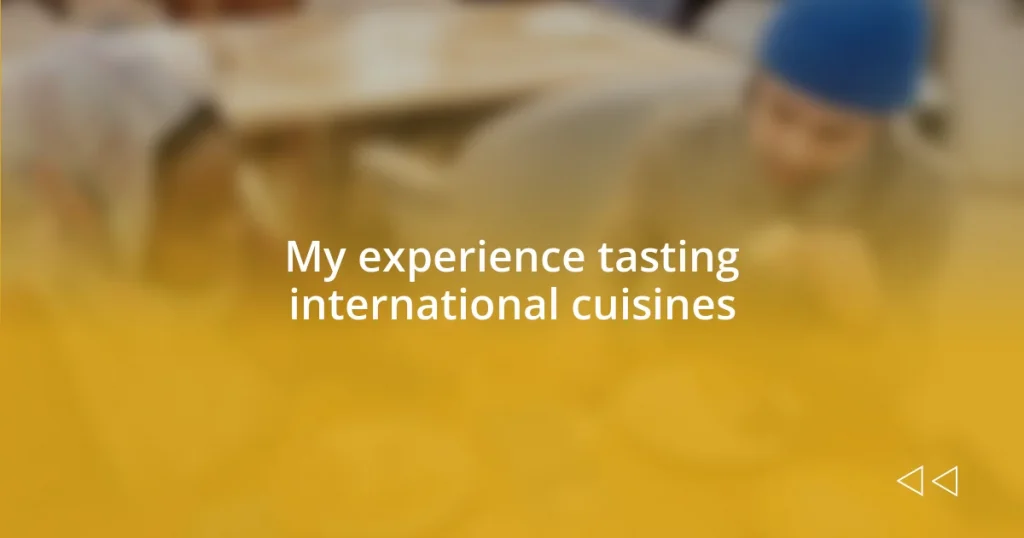Key takeaways:
- Experiencing international cuisines evokes emotional connections and transcends mere sustenance, enriching one’s worldview.
- Preparation and research enhance food tasting experiences, while savoring and sharing with friends amplify enjoyment.
- Immersing in cultural contexts and engaging with locals deepens appreciation for diverse cuisines and their accompanying narratives.

My journey with international cuisines
I still remember the first time I tasted authentic Thai street food. It was a whirlwind of flavors—with the spicy heat of chili intersecting with the sweet tang of tamarind and the freshness of herbs. Has there ever been a dish that transported you to another place? For me, that vibrant bowl of Pad Thai did just that.
As I set out to explore different cuisines, I often found myself surprised by the emotional connections that food can evoke. For instance, sharing a traditional Italian meal with friends brought back memories of my grandmother’s kitchen, filling the air with warmth and laughter. How can a simple plate of pasta stir such deep reflection and joy? It’s fascinating how the experience of food transcends mere sustenance and taps into our shared humanity.
Delving into Indian cuisine opened a whole new world for me, filled with spices I had never encountered before. The first time I enjoyed a rich curry, bursts of complexity danced on my palate, igniting curiosity and excitement. I often ask myself, why do we resist trying new things when they can lead to such transformative moments? Embracing international cuisines has truly enriched my life and expanded my worldview.

Essential tips for food tasting
When it comes to food tasting, I’ve learned that preparation is key. Taking a moment to understand the dish you’re about to try can enhance your experience significantly. I recall the first time I experimented with Peruvian ceviche. I read about the origins of the dish and the importance of fresh ingredients, which made each bite feel like a revelation, connecting me to the culture and traditions of the region.
Here are some essential tips to elevate your food tasting experience:
- Do your research: Learn about the dish’s background and cultural significance.
- Engage your senses: Pay attention to the colors, aromas, and textures before tasting.
- Savor slowly: Take small bites and allow the flavors to unfold on your palate.
- Pair thoughtfully: Consider how drinks or side dishes can complement the main dish you’re tasting.
- Share the journey: Tasting with friends allows for sharing insights and differing opinions, amplifying the enjoyment.
A good approach is to keep an open mind and embrace the unknown. I remember tasting Vietnamese pho for the first time, and I was surprised by how layered the flavors were. Instead of diving straight in, I took a moment to appreciate the aromatic broth and the fresh herbs. I realized that food tasting is as much about the experience as it is about the flavors. Allowing yourself to be curious and engaged will turn each tasting into a memorable adventure.

How to appreciate diverse cuisines
To truly appreciate diverse cuisines, I find it invaluable to immerse myself in the culture surrounding the food. When I sampled Moroccan tagine for the first time, it wasn’t just about the luscious flavors; it was about the customs of sharing a meal and how it brought people together. Have you ever paused to consider how food can serve as a bridge between different backgrounds, uniting us over a shared table?
Another way I’ve learned to appreciate different cuisines is by experimenting with cooking styles at home. I remember trying my hand at making sushi after enjoying a delightful meal at a local Japanese restaurant. Flipping through recipes and sourcing ingredients made me aware of the artistry behind each roll, deepening my respect for the chefs. It’s intriguing how preparation can transform our understanding of a cuisine—don’t you think that maybe cooking our favorite dishes can lead to a personal connection with the culture itself?
Finally, engaging with locals can dramatically enhance your culinary journey. On a trip to Mexico, I was fortunate to join a family for a traditional dinner. Listening to their stories while savoring homemade mole enriched my experience exponentially. How often do we overlook the human stories that accompany what’s on our plate? These moments made me realize that appreciating diverse cuisines is not just about flavors—it’s about the narratives and connections that unfold with every bite.















